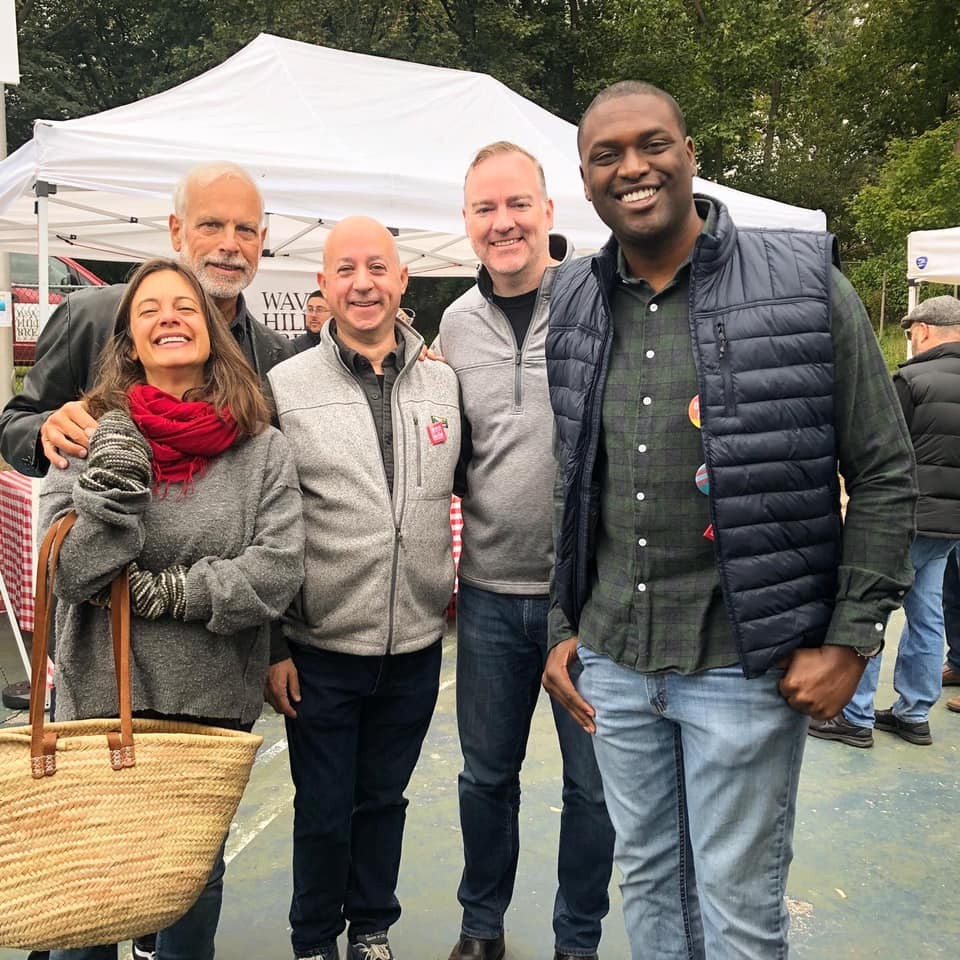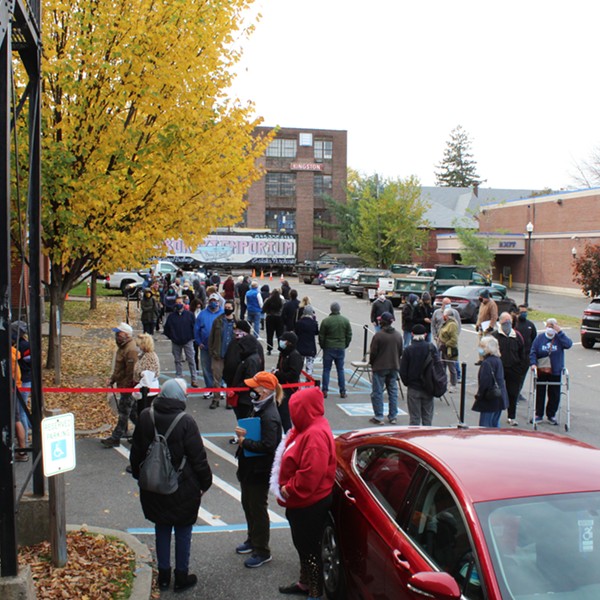When Nita Lowey announced her retirement on October 10, it rocked the state political establishment and sent lower-Hudson Valley Democrats into a mad dash to succeed her. The lengthy tenure of the 17th district congresswoman, who has represented Westchester and Rockland for three decades and chairs the powerful House Appropriations Committee, means there is a massive bench of would-be successors.
Rockland State Senator David Carlucci and Westchester Assemblyman David Buchwald are in. Westchester assemblymembers Amy Paulin and Thomas Abinanti are reportedly considering runs as well. (Former first daughter Chelsea Clinton, whom many had speculated to run, is out.) But those are the newcomers.
One Democrat has already been running for this seat since July. His name is Mondaire Jones, a black, gay, 32-year-old lawyer from Rockland who was challenging Lowey from the left, arguing that new blood and progressive solutions are needed in Congress.
“I was willing to go into the lion’s den this summer,” Jones says. “And I came out alive and stronger.”
Jones notes that he has great respect for Lowey as someone who helped pave the way for women and minorities in Congress, but he argues that his decision to take her on is evidence of the boldness that will be required to create progressive change in Washington. “You cannot put anyone else up against me and say that person has more fight in them,” Jones says.
Who Is Mondaire Jones?
In interviews, speeches, and on his website, Jones talks about his humble upbringing. He was raised in Spring Valley by a single mother, the daughter of a janitor and a housekeeper, who worked multiple jobs and still needed to rely on housing vouchers and food stamps. “I know what it’s like to struggle every day,” he says, before adding: “I now get to run to represent the people whose homes I watched my grandma clean growing up.”
In his freshman year of high school, Jones reactivated his local chapter of the NAACP Youth Council, registering black community members to vote and helping pass school budgets. When he was 19, he became chair of a committee on the NAACP’s Board of Directors.
Jones attended Stanford University, where he was elected vice president of the student government after “promising to restore the credibility of the [government] through advocacy work.” Jones says he led a campaign for faculty diversity, fought for a living wage for staff, and helped mobilize fellow students for police reform after the Palo Alto police chief made public statements endorsing racial profiling. Their efforts led to the chief’s resignation.
After college, Jones worked for the Department of Justice during the Obama administration, vetting candidates for federal judgeships and coauthoring a report on criminal justice reform.
He then went on to Harvard Law School. In his third year, he offered pro bono representation to indigent defendants, where he “saw firsthand how people of color are over-arrested, over-prosecuted, and over-sentenced.”
Following Harvard, Jones worked at elite corporate law firm Davis Polk & Wardwell to pay off $120,000 in law school debt. He also clerked for District Court Judge Andrew Carter.
Jones’s latest stints are as a cofounder of Rising Leaders, a nonprofit that teaches professional skills to underserved middle school students, and with the Westchester County Law Department, working on key civil litigation cases and serving as an advisor to the county’s executive, legislature, and human rights commission.

Making History
Jones says he chose to run for Congress in July for one main reason: “I’m fed up with Democrats not fighting hard enough for the things we say we believe in.”
If elected, Jones would be the first openly gay black member of Congress (Texas Representative Barbara Jordan, today widely acknowledged as queer, was not out during her time in Congress.) The historic nature of his candidacy is not lost on him.
“If I were growing up, and I could look to an openly gay, African American member of Congress, it would’ve been transformative in the way that I thought about myself as a gay person and about what was possible for me in the future,” he says. He notes that he never saw himself running for Congress when he was growing up, due to societal limitations.
Jones also says that, despite the progressive politics of his district, he has still faced homophobia since his announcement. Jones cites Carlucci’s former chief-of-staff, Jay Martin (who is also gay), referring to him as a “queen” on Twitter.
In another instance, Jones says, a Democratic elected official in the district “offered his endorsement, and then withdrew it two hours later because he had seen I was running as an openly gay candidate.” Jones would not reveal the name of the official in question, only noting he found the reversal “surprising.”
Jones makes abundantly clear that, as a black, gay man from a working-class background, policy is extremely personal to him.
“I think what qualifies a person to lead in office is personal experience,” he argues. “I think we need more people in office for whom policy is personal, because that dictates how hard they fight, and it gives them context.”
When speaking about his competitors, Jones does not mince words. Referring to Carlucci, a former member of the Independent Democratic Conference—a group of state senators who caucused with Republicans—he calls him a “Trump Democrat.”
“Nobody would’ve thought he would think he’s sufficiently rehabilitated himself to be elevated to Congress,” Jones adds. “It is his own hubris that allows him to believe he is somehow qualified to be a member of Congress.”
As for Buchwald, Jones alleges that he is “calling himself a progressive for the first time” in this campaign, despite his “record suggesting otherwise.” Jones calls himself “the one true progressive in this race,” but nevertheless concedes that the now-open primary will be a tough battle.

Let’s Get Down to Brass Tax
Jones has endorsed solidly progressive policy positions across the board, including Medicare for All; cancelling student debt and instituting free public college; mandating a $15 minimum wage; instituting criminal justice reform; and increasing affordable housing.
Asked if he believes that residents of the 19th-most affluent district in the country would respond favorably to such proposals, Jones stated a firm belief that they would be, and already are, receptive to his ideas.
“We are progressives,” he says. “People find me very much in line with the bread-and-butter local issues that people are concerned about, whether that’s middle class or wealthy people.” He adds that he thinks it’s telling that his opponents are referring to themselves as progressives. “I am in line with the views of the electorate here.”
Jones cites bringing back the State and Local Tax Deduction (SALT), which disproportionately benefited residents of states like New York with high state and local taxes, as one of his most popular policies. SALT was eliminated as part of the Trump administration’s 2017 tax reform bill.
One of Jones’s more unique proposals is appropriating funds for a high-speed rail line between Westchester and Rockland counties. “We have been so underserved here in Rockland County, as it concerns investment in transportation,” he says. “We need a lot of money to build a one-seat train into the city.”

Can He Win?
A common belief in politics is that elected officials have distinct advantages over other candidates in congressional elections because they’ve built relationships with voters and records of governance they can point to on the campaign trail.
Using that logic, Jones, as the only major candidate in the race who hasn’t held elected office, might be at a disadvantage. But he doesn’t see it that way.
“We’ve been doing a great job of getting our name out there,” Jones says, before citing his community work in public schools and with the Democratic Party apparatus in Rockland County, which he says is coalescing behind him and “does not want David Carlucci to run.”
Jones’s early challenge against Lowey has also provided him with one major asset over his opponents: money. Jones has been able to raise nearly a quarter of a million dollars, and wields $190,000 in on-hand cash to use against his new opponents, who enter the race with empty campaign coffers.
“We are gonna be getting our message out vigorously,” Jones says. “I’m grateful to be running into people and to be calling people who are saying, ‘Yeah, I heard about you, I heard about your story, and I think we need more people like you in office.’”
Andrew Solender is a political reporter based in Kingston. Follow him on Twitter @AndrewSolender.


















